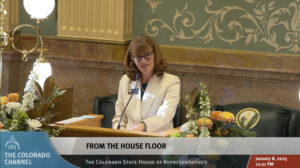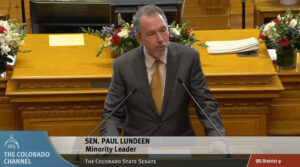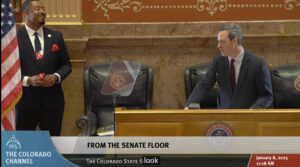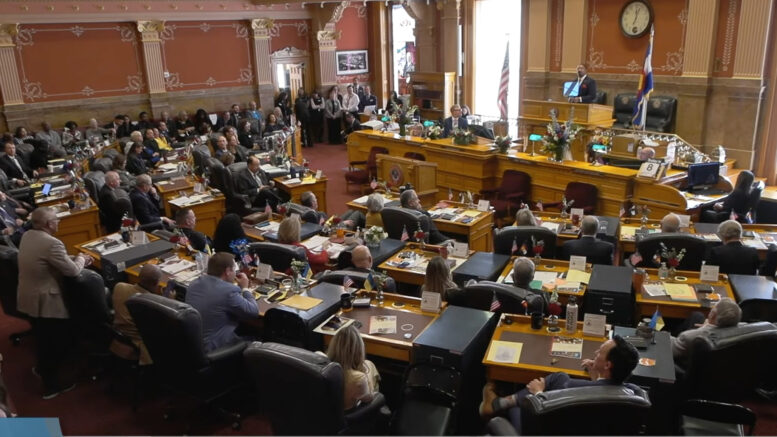Leaders of all four of Colorado’s legislative caucuses called for new laws that will help to bring down the cost of living during Wednesday’s opening day of the 2025 legislative session but differed significantly on how they seek to accomplish that goal.
The kickoff speeches from House Speaker Julie McCluskie, new Senate President James Coleman, Senate Minority Leader Paul Lundeen and House Minority Leader Rose Pugliese all revolved around a call for unity in the face of national political division. Such a theme is not uncommon, but these year’s opening-day salvos leaned into it more than usual, with McCluskie saying that post-election, the “responsibility to govern is now front and center.”
And to that end, all four leaders segued quickly into promises that they will make renewed efforts to make Colorado a more affordable place to live. Coleman cited high housing and health-care costs as major problems while McCluskie specifically mentioned rent prices and property insurance, Lundeen focused on the high cost of doing business and its impact on everyday Coloradans and Pugliese called out fees approved by the Legislature.
But it was in the specifics of how they want to tackle the affordability crisis that the legislative leaders began to diverge.
House speaker seeks construction-defects reform

Colorado House Speaker Julie McCluskie delivers remarks to her legislative chamber on Wednesday.
McCluskie leaned into housing costs and announced her support for new versions of two controversial pieces of legislation that died last year — including one that perished when its sponsor said she couldn’t muster the votes to guide it through the House. The Dillon Democrat said that 2025 will be the year that the Legislature resolves the stalemate on construction-defects reform and passes a bill seeking to prohibit landlords’ use of price-setting algorithms that opponents say drive up the cost of rent.
Coleman, D-Denver, announced that he will push several cost-of-living bills that got introduced in the early afternoon, including measures to increase the availability of modular housing, limit child-care costs and let the state and local governments build affordable housing. Intriguingly, the newly elected senate president, who sponsored and guided last year’s construction-defects reform bill to Senate passage before it died in the House, didn’t mention a renewed push on that piece of legislation.
Lundeen, meanwhile, spent almost his entire speech discussing the “suffocating” effect of fees and regulations on business owners and said those have led to the higher housing, energy and child-care costs that others want to curb. Coleman also alluded to the issue, saying he wants to “work alongside our partners in the business community to streamline processes to make it that much easier to create new jobs and support our local economies,” but Lundeen focused more on the problem.
Are regulations the source of high costs?

Colorado Senate Minority Leader urges regulatory reform on the Senate floor on Wednesday.
The Monument Republican pointed to a study commissioned by the Colorado Chamber of Commerce that ranked the state sixth in the country for its total number of regulations and identified what he called “a staggering” 45% of them as excessive or duplicative. Lundeen called on legislators to begin reviewing existing regulations and eliminating those that aren’t working for the state and said that as Colorado’s economic competitiveness is falling, the body must commit to a “first do no harm” attitude when debating new rules.
“This isn’t about deregulation for the sake of it. It’s about something much deeper. It’s about freedom — the freedom to create, to innovate and to dream big,” Lundeen said, adding that increases in regulations lead to a reduction in jobs. “It’s about opportunity. We can make sure every Coloradan has a fair shot at success. And it’s about responsibility. We must recognize that prosperity doesn’t come from government mandates but from the hard work, ingenuity and determination of our people.”
Pugliese, R-Colorado Springs, and Lundeen cited legislatively OK’d fees as an affordability problem, with Lundeen specifically saying he hopes to repeal a 29-cent delivery fee and a 10-cent fee that stores providing customers disposable bags must charge to them. However, with neither Coleman nor McCluskie broaching the subject of fees, that effort likely faces an uphill climb.

Colorado House Minority Leader Rose Pugliese delivers remarks during the opening day of the legislative session on Wednesday.
Democrats ready to push labor-requested reforms this session
Beyond affordability and regulations, the leaders, who largely kept their speeches broad without bogging them down in specific policy goals, diverged along more typical party lines.
Coleman, for example, followed his assertion that the Senate will “work to make sure Colorado is a great place to do business and ensure that it is a great place to be employed” by boasting of his party’s introduction of a bill to change the Labor Peace Act. The business-opposed measure, which McCluskie seemed to reference in backing efforts to “strengthen workers’ voices,” would eliminate a second election necessary for unions to collect fees from all a unionized company’s employees to fund bargaining activities.
McCluskie dove most deeply on housing costs, saying her caucus also will push measures to incentive modular home construction, ease red tape for religious institutions to build on their own land and try “creative new approaches” to lower property insurance costs. Pugliese broached the subject too but took a different approach, saying that legislators have made housing more expensive by adding regulations around building and must rethink that strategy to bring down home prices.
Environmental goals for session unclear

New Colorado Senate President James Coleman prepares to receive the gavel from term-limited Senate President Steve Feinberg on Wednesday.
Both McCluskie and Coleman referenced protecting Colorado’s environment and cleaning the air, but neither hinted at what further measures they may seek to add onto six straight years of increasing protections by the Legislature. McCluskie, however, did say that she believes Colorado will continue to face threats to its water resources — it’s in negotiations with six other states about potential cutbacks to Colorado River usage — and “may have to play defense” a bit more.
And for a change, all four caucus leaders’ speeches were largely silent on how to reduce health-care costs, which has been one of the defining issues of Gov. Jared Polis’ tenure. Hospitals and pharmaceutical manufacturers are preparing to battle over restrictions that many drug makers have placed on discounts available through the federal 340B drug-pricing program, but caucus leaders appear to be slow in wanting to wade into that battle.
The session continues tomorrow with Polis slated to make his seventh State of the State Address of his time in office. The Democratic governor tends more than legislative leaders to lean into specific policy proposals in his session-opening speech, and many Capitol observers are eager to see what he will identify as his priorities this year.
